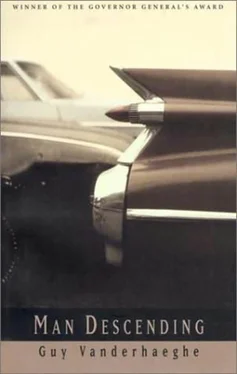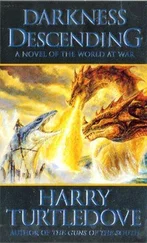My mother would lean over to me and say confidentially, “He’s thinking it all out. It’ll come to him, what to do.”
I never knew whether she was trying to reassure me or herself. At last my mother would get to her feet and call to him, telling him she was going up to bed. He never answered. I waited a little longer, believing that watching him I kept him safe in the night. But I always gave up before he did and went to bed too.
The second week of September I returned to school. Small differences are keenly felt. For the first time there was no new sweater, or unsharpened pencils, or new fountain pen whose nib hadn’t spread under my heavy writing hand. The school was the same school I had gone to for eight years, but that day I climbed the stairs to the second floor that housed the high school. Up there the wind moaned more persistently than I remembered it had below, and intermittently it threw handfuls of dirt and dust from the schoolyard against the windows with a gritty rattle.
Our teacher, Mrs. MacDonald, introduced herself to us, though she needed no introduction since everyone knew who she was – she had taught there for over ten years. We were given our texts and it cheered me a little to see I would have no trouble with Latin after my summer’s work. Then we were given a form on which we wrote a lot of useless information. When I came to the space which asked for Racial Origin I paused, and then, out of loyalty to my father, numbly wrote in “Canadian.”
After that we were told we could leave. I put my texts away in a locker for the first time – we had had none in public school – but somehow it felt strange going home from school empty-handed. So I stopped at the library door and went in. There was no school librarian and only a few shelves of books, seldom touched. The room smelled of dry paper and heat. I wandered around aimlessly, taking books down, opening them, and putting them back. That is, until I happened on Caesar’s The Gallic Wars . It was a small, thick book that nestled comfortably in the hand. I opened it and saw that the left-hand pages were printed in Latin and the right-hand pages were a corresponding English translation. I carried it away with me, dreaming of more than proficiency in Latin.
When I got home my mother was standing on the front step, peering anxiously up and down the street.
“Have you seen your father?” she asked.
“No,” I said. “Why?”
She began to cry. “I told him all the money was gone. I asked him if I could apply for relief. He said he’d go himself and have it out with them. Stand on his rights. He took everything with him. His citizenship papers, baptismal certificate, old passport, bank book, everything. I said, ‘Everyone knows you. There’s no need.’ But he said he needed proof. Of what? He’ll cause a scandal. He’s been gone for an hour.”
We went into the house and sat in the living-room. “I’m a foolish woman,” she said. She got up and hugged me awkwardly. “He’ll be all right.”
We sat a long time listening for his footsteps. At last we heard someone come up the walk. My mother got up and said, “There he is.” But there was a knock at the door.
I heard them talking at the door. The man said, “Edith, you better come with me. George is in some trouble.”
My mother asked what trouble.
“You just better come. He gave the town clerk a poke. The constable and doctor have him now. The doctor wants to talk to you about signing some papers.”
“I’m not signing any papers,” my mother said.
“You’d better come, Edith.”
She came into the living-room and said to me, “I’m going to get your father.”
I didn’t believe her for a minute. She put her coat on and went out.
She didn’t bring him home. They took him to an asylum. It was a shameful word then, asylum. But I see it in a different light now. It seems the proper word now, suggesting as it does refuge, a place to hide.
I’m not sure why all this happened to him. Perhaps there is no reason anyone can put their finger on, although I have my ideas.
But I needed a reason then. I needed a reason that would lend him a little dignity, or rather, lend me a little dignity; for I was ashamed of him out of my own weakness. I needed him to be strong, or at least tragic. I didn’t know that most people are neither.
When you clutch at straws, anything will do. I read my answer out of Caesar’s The Gallic Wars , the fat little book I had carried home. In the beginning of Book I he writes, “Of all people the Belgae are the most courageous…” I read on, sharing Caesar’s admiration for a people who would not submit but chose to fight and see glory in their wounds. I misread it all, and bent it until I was satisfied. I reasoned the way I had to, for my sake, for my father’s. What was he but a man dishonoured by faceless foes? His instincts could not help but prevail, and like his ancestors, in the end, on that one day, what could he do but make the shadows real, and fight to be free of them?
YOU’D THINK my old man was the Pope’s nephew or something if you’d seen how wild he went when he learned I’d been sneaking off Sundays to Faith Baptist Church. Instead of going to eleven o’clock Mass like he figured I was.
Which is kind of funny. Because although Mom is solid R.C. – eight o’clock Mass and saying a rosary at the drop of a hat – nobody ever accused Pop of being a religious fanatic by no means. He goes to confession regular like an oil change, every five thousand miles, or Easter, whichever comes first.
Take the Knights of Columbus. He wouldn’t join those guys for no money. Whenever Mom starts in on him about enlisting he just answers back that he can’t afford the outlay on armour and where’d we keep a horse? Which is his idea of a joke. So it isn’t exactly as if he was St. Joan of Arc himself to go criticizing me.
And Pop wouldn’t have been none the wiser if it wasn’t for my older brother Gene, the prick. Don’t think I don’t know who told. But I can’t expect nothing different from that horse’s ass.
So, as I was saying, my old man didn’t exactly take it all in stride. “Baptists! Baptists! I’m having your head examined. Do you hear me? I’m having it examined! Just keep it up and see if I don’t, you crazy little pecker. They roll in the aisles. Baptists, for chrissakes!”
“I been three times already and nobody rolled in an aisle once.”
“Three times? Three times? Now it all comes out. Three, eh?” He actually hits himself in the forehead with the heel of his palm. Twice. “Jesus Christ Almighty, I’m blessed with a son like this? What’s the matter with you? Why can’t you ever do something I can understand?”
“Like wrecking cars?” This is a swift kick in the old fun sack. Pop’s just getting over Gene’s totalling off the first new car he’s bought in eight years. A 1966 Chevy Impala.
“Shut your smart mouth. Don’t go dragging your brother into this. Anyway, what he done to the car was accidental . But not you. Oh no, you marched into that collection of religious screwballs, holy belly-floppers, and linoleum-beaters under your own steam. On purpose . For God’s sake, Billy, that’s no religion that – it’s exercise . Stay away from them Baptists.”
“Can’t,” I says to him.
“Can’t? Can’t? Why the hell not?”
“Matter of principle.”
They teach us that in school, matters of principle. I swear it’s a plot to get us all slaughtered the day they graduate us out the door. It’s their revenge, see? Here we are reading books in literature class about some banana who’s only got one oar in the water to start with, and then he pops it out worrying about principles. Like that Hamlet, or what’s his name in A Tale of Two Cities . Ever notice how many of those guys are alive at the end of those books they teach us from?
Читать дальше












